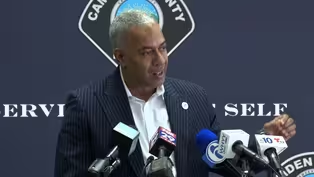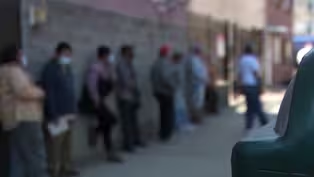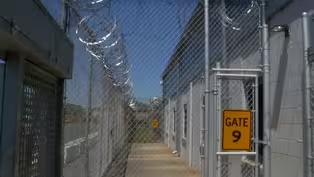NJ Spotlight News
NJ Spotlight News: January 7, 2025
1/7/2025 | 26m 46sVideo has Closed Captions
Watch as the NJ Spotlight News team breaks down today’s top stories.
We bring you what’s relevant and important in New Jersey news and our insight. Watch as the NJ Spotlight News team breaks down today’s top stories.
Problems playing video? | Closed Captioning Feedback
Problems playing video? | Closed Captioning Feedback
NJ Spotlight News is a local public television program presented by THIRTEEN PBS
NJ Spotlight News
NJ Spotlight News: January 7, 2025
1/7/2025 | 26m 46sVideo has Closed Captions
We bring you what’s relevant and important in New Jersey news and our insight. Watch as the NJ Spotlight News team breaks down today’s top stories.
Problems playing video? | Closed Captioning Feedback
How to Watch NJ Spotlight News
NJ Spotlight News is available to stream on pbs.org and the free PBS App, available on iPhone, Apple TV, Android TV, Android smartphones, Amazon Fire TV, Amazon Fire Tablet, Roku, Samsung Smart TV, and Vizio.
Providing Support for PBS.org
Learn Moreabout PBS online sponsorship>> Funding for NJ Spotlight news provided by the members of the New Jersey education Association.
Making public schools great for every child.
Let's be healthy together.
And/or stead, continue to committing clean, reliable energy.
>> Tonight on NJ spotlight news.
Cold blue.
The winter blast impacts the state, bringing frigid temperatures, hazardous wind conditions, and over seven inches of snow.
With congestion pricing three days in, data tracking shows commuting time declines as Bergen County officials look for expanding public transit services.
>> Where the most populous county in the state, and we don't have the ability to take rail service, mass transit rail service, or a rail line into the city.
That is just not fair.
>> The city of Camden celebrating a reduction in crime rates and quality of life improvements.
What is next for a city once considered the most dangerous in America.
>> It is a template for how other urban areas can turn around New Jersey.
>> Ending homelessness.
The country and state witnessing an increase in homelessness.
What is behind the surge and the search for shelter.
>> Being asked to share a residence or almost responsible for one of two cases of homelessness.
>> NJ spotlight news begins now.
>> From NJ PBS Studios, this is NJ spotlight news.
>> Good evening and thanks for joining us.
I'm Raven Santana.
We begin with a few of today's top headlines.
The cold keeps coming as dozens of schools today announced delays and closures due to the snowstorm.
A code blue advisory has been issued for all 21 New Jersey counties for most of the week as the winter storm continues to batter the state, bringing frigid temperatures.
When factoring in the windchill, some areas of the garden state experiencing single-digit temperatures.
Including in New Brunswick, where it felt like eight degrees.
Temperatures expected to drop overnight with officials urging residents to take precautions due to an increased risk of frostbite and hypothermia.
This 24 hours after the winter storm continues to batter much of the tri-state area.
Much of South Jersey dumping up to eight inches of snow.
Snow expected to continue through most of the night.
If you see someone who is unsheltered and needs nonemergency services, text path home 285511.
Also as if another strain of COVID, the flu and warnings about bird flu weren't enough, Jersey is seeing a surgeon another highly contagious virus.
Above being described as short-lived but intense and most impacted are expected to experience vomiting and diarrhea.
Of the 195 Norovirus outbreaks reported last year, 70 came in December.
The U.S. is also having its worse Norovirus outbreak in years.
More cases than in the last 10 years combined.
The best way to prevent contracting is by washing your hands with soap and water and making sure not to prepare, handle food, or care for others when sick.
The early days of congestion pricing in Manhattan are showing signs of success.
The program which charges most drivers nine dollars to enter Manhattan south of 60th Street aims to slash traffic while also reducing hair pollution and raising money for public transit.
During Monday's morning rush-hour, drivers had a 14 minute commute.
That is down from the typical 23 minute drive.
Drivers taking the Lincoln Tunnel saw their commutes cut roughly in half.
The data comes from Google maps traffic data.
It is early proof the program will work.
Congestion pricing opponents were more skeptical, pinning the traffic decline on the poor weather.
Officials in Bergen County remain frustrated by the implementation of congestion pricing.
Pushing back with concerns the new plan will hurt North Jersey commuters.
Your renewing calls after decades of inaction to extend the Hudson Bergen light Rail to Inglewood to provide residents with public transit options since part of the goal is to get more people to leave their car at home and take mass transit.
David Cruz has more on whether or not the request remains a pipedream or reality for commuters.
>> Congestion pricing has begun.
Now as they say, late.
Whatever impact New Jersey feels, environmental, economic, and congestion wise, it will have to face on its own.
Because the settlement dollars offered by New York are no longer on the table.
That hurts, says Jim to disco.
His county will feel the impact the most.
>> We were going to ask some of the money be dedicated toward the expansion of the light rail from Hudson into Bergen.
That way at least it gives the people in the east side of the county with no rail service a way to take mass transit into the city.
And alleviate some of that congestion.
>> Most talk about light rail expansion and there has been a lot of talk about it centered on what impact expansion would have on Northbound community traffic area but Bergen residents would welcome it to the ferry service.
Loretta Weinberg, a longtime advocate for light rail expansion or the northern branch, is not confident there is a will, let alone a way.
>> New Jersey transit, each budgie gives it a tip of the hat to the northern branch and goes on to widening turnpikes and all kinds of things and not really mass transit.
A lot going on here that does not make me confident about the future of mass transit in this portion of New Jersey.
>> Transportation reporter says the paperwork on getting to the next step hoping for light rail expansion is still being worked on.
>> Not much can happen until NJ transit updates the environmental impact statement.
That is underway.
If all goes well, we should see an updated environmental impact statement going to the FDA August 2025.
That begins the laborious process to start to cobble together funding for the $1.28 billion it will take to build this thing.
>> Commuters wondering if there will be a day when Bergen will have a stop on the Hudson Bergen light rail.
And why not?
>> More people will be on the train, a lot of people don't want to drive that much.
The cold weather, snow and all that.
You jump on a train and don't worry about anything and it is not that expensive.
You pay more for gas and parking than you do the train.
>> And somebody owes the people of Bergen County.
>> There is no Bergen Hudson light rail.
It is in Hudson.
That is not fair to the one million people.
We are the most populous county in the state, most dense, and we don't have the ability to take mass transit rail service, or a rail line into the city.
That is not fair.
Wax the courts are not on Jersey's side.
The settlement offers for how much and what exactly we may never know, appear to be gone.
For the County executive and other advocates, the song remains the same.
Even a quarter-century later.
I'm David Cruz, NJ spotlight news.
>> The crime rate in the city of Camden is at an all-time low.
The mayor and other city officials attribute in the improvements to major changes in the quality of life in the city.
A city once known as one of the most dangerous in America.
In 2013, when faced with high crime and poor police community relations, Camden restructured its Police Department and replaced it with the Camden County Police Department.
Since then, the city has seen a reduction in crime and progress when it comes to education, economic development, infrastructure, housing, and more.
Ted Goldberg has more on how residents are feeling about the progress.
>> If the template for how other urban areas can turn around and New Jersey.
>> Leaders in Camden say the resurgence Israel.
With big numbers to back up their words.
>> We have witnessed an overall 75% reduction in homicide.
>> Arsons are down 61%.
Burglary, 70 2%.
Rape, 20%.
Robbery, 76%.
>> These reductions are since Camden reorganized its Police Department in 2013.
Disbanding the city police and living under the protection of the Camden County Police Department.
>> I lived through those hard days in the 1980's and 1990's where you were a prisoner of your home.
Residents were scared to call the police department.
The residents want to tell them something is going on.
I lived that life.
>> What changed city wide to make the crime numbers plummet?
>> The city and plummeted policing strategies and increased investment in training and resources to reduce crime.
>> Originally the NAACP was not in favor of transitioning the department from the city to the Metro force.
We were combative about the process.
President Smith and I said we were glad the skepticism we had had turned into optimism.
>> Leaders did more than reorganize the police department.
They used tax incentives to lower companies to Camden.
Like the Philadelphia 76ers, who practice near the waterfront.
They use creative programs to give job-training to kids who drop out of school.
>> In a lot of places, people think young adults are the problem.
This city has recognized those young adults are the solution to the city's biggest problem.
We identified those adolescents at risk, brought them in, provided them with the services to put them on a path to success rather than a path through criminal activity.
>> The path for safer communities begins with providing the youth opportunities, we have invested in various programs such as the village initiative.
>> Leaders praise new grants from city, county, state, and federal sources, which helped bolster city schools.
>> All of these investments and initiatives and learning progress have led to the city's graduation rate jumping from 49% to over 70%.
>> Despite citywide success, poverty is high in Camden.
Leaders say improvement citywide will bring it down in the future.
>> Statistics and data, like a lot of the urban community.
It is hard to sit here when someone says I respect your opinion, it will take time.
>> The future development of these employers >> Residents who braved the cold told me Camden feel safer than in the past.
Ask I feel at the crime rate has gone down, I've seen changes where I used to live.
We have a lot of new homes.
>> More cops involved in the community.
Camden is very much a given community.
>> Next is lack of affordable housing.
Leaders say Camden is working on that as well.
With more street paving and work to restore the parks.
In Camden, Ted Goldberg.
>> A new geriatric release report shedding light on what it is like to age in prison.
It recommends new legislation to help the release of prisoners who are at least 60 years old and have served a sentence of at least 20 years.
Under state law, even if elderly prisoners qualify for parole, they can be denied release by the parole board for decades all defenses.
Brenda Flanagan has more on that legislation advocates say will reduce the population, save money, and maintain public safety.
>> For a lot of older people, they are waiting to die.
>> 55-year-old Calvin Basch grew up behind bars.
He went to prison at age 14, convicted in a new arc murder case.
He spent 30 years, where he often volunteered to sit with inmates in palliative care.
Men in their 70's and 80's.
>> Down in prison, your soul is not at peace.
>> It is a matter not just of some sort of radical criminal justice reform project, but pure humanity.
People who are sick and old should not have to die in jail.
>> Attorney Lori lunch Greg spoke at a news conference were prisons house almost 1000 inmates over the age of 60.
But while many states offer geriatric Troy -- parole, they don't unless a prisoner suffering from a terminal illness or permanent disability.
These folks want to change that with new legislation.
>> People released at the age of 60 or older almost never go back to prison.
It is a distinct population.
>> We have been petitioned by many families who want to take their elderly loved one into their home for their last years of their life.
This is a compassionate course, both by the diminishment -- the minimus risk by virtue of their age, but the appreciable cost savings which would work to the benefit of the state, particularly in terms of health care and Medicaid.
>> The New Jersey reentry Corporation which helps in their community.
He says jersey pays $74,000 a year to house and care for each inmate, but health care costs soar as prisoners age.
Geriatric release can save New Jersey taxpayers millions.
>> At a time of fiscal difficulties.
The imperative to save money will be compelling.
But leaving it aside, the sense that too many old people are being housed in our jails and prisons is one that is really sweeping the country.
>> The corporation unveiled a geriatric release report that recommends certificates of eligibility to petition the court for their release at least six years old and serve 20 years or more, or 62 and serve 30 years or more in murder cases.
The judge should consider a state of rehabilitation, disciplinary records, psychiatric evaluation if warranted, and statement.
>> New Jersey studied the issue for years, a special criminal sentencing organization came up with an identical proposal.
It includes many factors judges have to consider.
>> this is a robust and rigorous review of the petitioner's background and the suitability of the petition to be released.
>> the inmate would enjoy a presumption of release unless they are a danger to a person or the community.
Simply not ready for independence, or if the release is against the interests of justice.
>> a crime was committed.
But putting the mitigating factors in, the inmate saying he no longer committed the crime 20 or 30 years ago.
>> it includes draft legislation and Hudson -- Hudson Democrat says he supports a geriatric release bill by facilitating the reentry into society, we not only promote rehabilitation, but enhance public safety and compassion in our communities.
The measure also requires housing and other supports like enrollment in Medicare or Medicaid.
>> maître d'can get health care, psychological and physical supports somebody needs.
>> it goes to show if you don't have people who believe in second chances, -- >> advocates hope to move it with bipartisan support.
In Trenton, Brenda Flanagan.
>>>> last week, the U.S. Department of Housing and Urban Development released its annual homelessness assessment report.
They found more than 770,000 experiencing homelessness across the country on a single night in January 20 24.
An 18% increase from 2023.
In New Jersey, the latest point in time count saw an even higher increase, 24% over the prior year.
What is behind the surge of shelter, Michael Hallahan is the director of the office of homelessness prevention with the Department of community affairs.
He joins me to put it in context.
>> thank you for having me.
>> Hunter recently reported an 18% increase in homelessness year-over-year.
That is based on a point in time count.
New Jersey has also seen them rise.
What are the main factors contributing to this increase in homelessness?
>> particularly across New Jersey, one of the main causes of homelessness, it is not what people would generally associate with homelessness.
Mental health challenges or substance use.
But it is evictions and being asked to leave a shared residence.
They are responsible for almost one in every two cases of homelessness this year.
>> what is this state doing to help prevent evictions to keep people in steady housing?
>> one of the great things we are doing in the state with the administration is working with our nonprofit partners, but also embedding resource navigators through the diversion initiative.
.
in housing court where that is taking place, this is where you have a case manager that has access to the entire constellation of eviction provincial resources.
Importantly, those programs allowed in real-time, us being able to see the folks in the high prices situation.
The flipside is we are working with our partners at New Jersey courts to ensure that one someone is on the eviction docket, that it is coming out.
Or there is substantive increase or data technology to connect persons so we can see them as far upstream as possible.
>> is it working?
What are the results looking like?
>> I would say it is definitely working when you look at our regional sister states.
When you look at the number of states leveraging this eviction diversion model and homelessness prevention model to get as far upstream as possible.
We are seeing Maryland, which had lower numbers compare to us but they have made into it just as a as we have.
If we can prevent patients, that is how we can -- individual homelessness and family homelessness.
Bikes people often seem addiction and mental health issue lead to homelessness.
In your experience, is that it?
>> I wouldn't say so.
One of the challenges in homelessness at large is it is often a chicken or the egg thing.
Which came first?
The housing crisis that precipitated the mental health challenge, or using substances -- >> let's talk about a population we see decreasing.
Veteran homelessness dropped 8% nationwide.
Are we seeing a drop in New Jersey as well?
>> importantly, we are seeing a drop in veteran homelessness.
But the administration is really leaning into not only continuing to encourage that drop, but fundamentally end veteran homelessness.
We stood off the bringing back to veterans home initiative.
We are deploying over $40 million in resources with every thing from state frontal assistance and those engaging with homeless veterans living in encampments or in the woods or different places.
>> all of these programs the state is starting,?
>> Out of procurement for some of those bringing vets home initiative.
We partnered strongly, working with the partners.
We have 19 veterans that were homeless up until yesterday that were in the pipeline to be housed even this month.
And importantly going full throttle, we should be housing near and about 75 homeless veterans per month.
>> we know the point in time homeless count is at the end of the month.
What are you anticipating as we look ahead?
>> you will see the continued year-over-year increase be acutely felt through the communities.
I think the point in time count is fantastic for communities to get dialed into what is happening in their continuum of care and partner with the various nonprofit and community-based organizations doing this work.
>> A lot of work to be done, efforts in the right place.
Thank you for joining me.
And finally, some great news for two iconic New Jersey birds that were almost lost forever.
Bald eagles and ospreys were both officially removed from the state endangered species list Monday.
Capping off a dramatic recovery in recent decades.
Both species were pushed to the brink in the 1970's by the widespread use of ddt, which accumulated in the food chain to lay bigs with shells too thin to survive.
By the early 80's, a single known bald Eagle left in New Jersey in a remote area in Delaware Bay.
And 50 Osprey it was banned in 1992 and state efforts to restore the local bald eagle population kicked off the 1980's with the relocation of eagles from Canada and an artificial incubation program.
It is part of a national trend.
Bald eagles were taken off of the federal endangered threatened list in 2007.
That will do it for us.
Download the NJ spotlight news podcast so you can listen to us any time.
For the entire team at NJ spotlight news, thanks for being with us.
Have a great night and we will see you tomorrow.
>> NGM insurance group, serving the insurance needs of residents and businesses for more than 100 years.
And by the PSEG foundation.
Bald eagles, ospreys removed from NJ endangered list
Video has Closed Captions
Clip: 1/7/2025 | 1m 8s | Both bird species were on the brink in the 1970s due to DDT use (1m 8s)
Bergen executive renews call for light rail expansion
Video has Closed Captions
Clip: 1/7/2025 | 4m 32s | Jim Tedesco says Bergen residents would welcome a way to get to PATH or ferry service (4m 32s)
Camden crime numbers drop as credit for it varies
Video has Closed Captions
Clip: 1/7/2025 | 4m 34s | Leaders say homicides have dropped by 75% and arsons are down 61% (4m 34s)
Here's what's driving the surge in homelessness
Video has Closed Captions
Clip: 1/7/2025 | 5m 58s | Interview: Michael Callahan, director of NJ's Office of Homelessness Prevention (5m 58s)
Norovirus cases surging in New Jersey
Video has Closed Captions
Clip: 1/7/2025 | 56s | The stomach bug is described as 'short-lived but intense' (56s)
Should elderly prisoners get geriatric release?
Video has Closed Captions
Clip: 1/7/2025 | 4m 59s | Advocates argue only 1-3% of released inmates over age 60 actually end up back behind bars (4m 59s)
Providing Support for PBS.org
Learn Moreabout PBS online sponsorship
- News and Public Affairs

Top journalists deliver compelling original analysis of the hour's headlines.

- News and Public Affairs

FRONTLINE is investigative journalism that questions, explains and changes our world.












Support for PBS provided by:
NJ Spotlight News is a local public television program presented by THIRTEEN PBS





